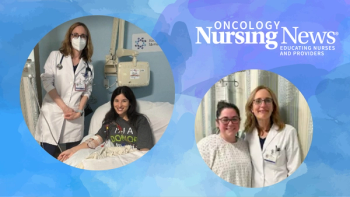
Hilda Haynes-Lewis and Rosaleen Bloom on Financial Toxicity and Workplace Stressors for Patients Undergoing Radiation

Hilda Haynes-Lewis, PhD, ANP-BC, AOCNP; and Rosaleen Bloom PhD, APRN, ACNS-BC, AOCNS, discuss the ways a cancer diagnosis can impair an individual’s ability to work normally.
Oncology nurses need to understand the specific financial stressors and workplace adjustments being experienced by their patients to help design future interventions, according to Hilda Haynes-Lewis, PhD, ANP-BC, AOCNP; and Rosaleen Bloom, PhD, APRN, ACNS-BC, AOCNS.
“If we work with the patient and find out what their particular stressors are—and see how they’re coping—we can [help them] make adjustments,” said Haynes-Lewis, who is a nurse practitioner in radiation oncology at Montefiore Einstein Cancer Center and an assistant professor of radiation oncology at the Albert Einstein College of Medicine.
Bloom, who is an assistant professor at Texas A&M University, recently presented findings on financial toxicity with Haynes-Lewis during the 48th Annual Oncology Nursing Congress. In an interview ahead of their presentation, they sat down with Oncology Nursing News® to explain how nurses can advocate for flexible workplaces and financial relief for all patients, particularly those with a lower socioeconomic status or those who are undergoing radiation.
They explained that as cancer costs continue to increase in the United States, patients who are receiving active treatment are at risk of various financial stressors. They therefore sought to explore the self-reported stressors and workplace adjustments individuals who completed radiation therapy had experienced. Their research comprised preliminary qualitative findings from an ongoing mixed-methods study at Montefiore Einstein Cancer Center, in the Bronx, New York.
The study included 20 participants who were receiving radiation therapy at the Urban Cancer Center. The median patient age was 62.3 years. Most patients were women (65%). One-quarter of the patients had a diagnosis of breast cancer (25%), 25% had endometrium cancer, and 25% had prostate cancer. The remaining 25% had a variety of diagnoses. Moreover, 40% (n = 8) were privately insured, 40% (n = 8) had Medicare, and 20% had Medicaid (n = 4). Patients participated in restructured telephone interviews between January 2021 and June 2022. The interviews were recorded, transcribed, de-identified and uploaded to Atlas.ti. The investigators then conducted qualitative analyses by using descriptive and in vivo coding.
The results from the interviews revealed that many patients needed assistance paying bills and had lost income because of their treatment schedules and related adverse events. They also depleted allowable time off or took unpaid time off and were working throughout their treatment to pay bills. Many patients were no longer able to pay rent or continue working. Others expressed that they were unable to take the required amount of time off work to receive their treatments.
According to the Haynes-Lewis and Bloom, nurses can play a huge role in advocating for future legislation and policies that promote flexible workplace culture and help provide patients with financial relief.
“The day-to-day practical implications are really working with patients to understand what their specific financial stressors are and what are they concerned about, and then working within your cancer center and community to find out what resources we have available,” Bloom remarked. “On a policy level, we need to really advocate for paid leaves [and] for flexible workplaces.”
Reference
Duggan Bloom R, Haynes-Lewis H, Kalnicki, S, Garg M. Income loss and limited resources: financial stressors and work adjustments for individuals with cancer receiving radiation therapy at an urban academic cancer center. Poster presented at: 48th Annual Oncology Nursing Society Congress; April 26-30, 2023; San Antonio, Texas. Accessed April 25, 2023.
Newsletter
Knowledge is power. Don’t miss the most recent breakthroughs in cancer care.

































